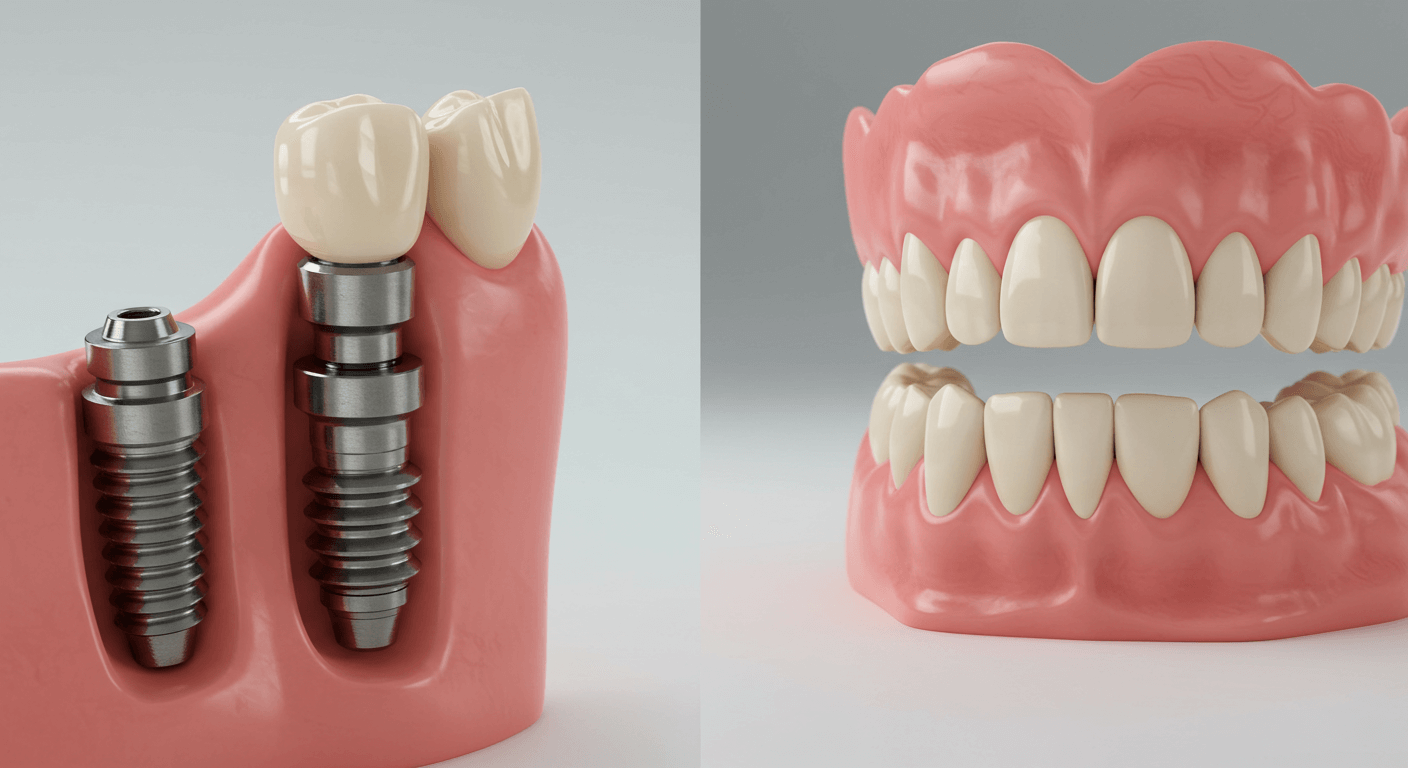Understanding Dental Restoration Options
When it comes to restoring your smile and oral functionality, two popular options stand out: dental implants and dentures here at Viva Dental, Lancaster. Both serve the purpose of replacing missing teeth, but they differ significantly in their approach, longevity, and overall impact on your oral health.
Dental implants are artificial tooth roots, typically made of titanium, that are surgically placed into your jawbone. These implants serve as a sturdy foundation for replacement teeth, which are custom-made to match your natural teeth. The result is a permanent solution that looks, feels, and functions like your original teeth.
On the other hand, dentures are removable appliances that can replace multiple teeth or even an entire arch. They consist of artificial teeth attached to a flesh-coloured base that fits over your gums. While traditional dentures rely on suction or adhesives to stay in place, modern variants can also be supported by dental implants for improved stability.
Comfort and Functionality in Daily Life
The comfort and functionality of your dental restoration can significantly impact your quality of life. Dental implants offer a level of comfort and functionality that closely mimics natural teeth. Once the implants have fully integrated with your jawbone, you’ll likely forget they’re not your original teeth.
With implants, you can eat, speak, and laugh without worrying about your teeth slipping or falling out. They provide a strong biting force, allowing you to enjoy a wide variety of foods without restrictions. This can have a positive impact on your nutrition and overall health.
Dentures, while functional, may take some time to get used to. Initially, you might experience some discomfort or irritation as your mouth adjusts to the new appliance. Speaking and eating might feel different at first, and you may need to avoid certain hard or sticky foods. However, modern dentures are more comfortable and stable than ever before, especially implant-supported variants.
Aesthetic Considerations: Natural Look and Feel
When it comes to aesthetics, both dental implants and dentures have come a long way in mimicking the appearance of natural teeth. However, there are some differences to consider.
Dental implants offer the most natural-looking result. The replacement teeth are custom-made to match the colour, shape, and size of your existing teeth. Because they’re anchored directly to your jawbone, they emerge from your gums just like natural teeth, creating a seamless and authentic appearance.
Dentures have also improved significantly in terms of aesthetics. Modern dentures are designed to look natural, with teeth that are shaped and coloured to blend with your facial features. However, there may still be visible clasps or a slight gap between the denture and your gums, which can be noticeable in some cases.
Consider the following points when evaluating the aesthetic aspects:
- Dental Implants:
- Look and feel like natural teeth
- No visible hardware or gaps
- Preserve your facial structure
- Dentures:
- Can look natural but may have visible clasps
- May cause changes in facial structure over time
- Can be removed for cleaning
Maintenance Requirements for Implants and Dentures
Proper maintenance is crucial for the longevity and effectiveness of both dental implants and dentures. However, the care routines differ significantly between the two options.
Dental implants require care similar to your natural teeth. This includes:
- Brushing twice daily with a soft-bristled toothbrush
- Flossing daily, paying extra attention around the implant
- Using an antibacterial mouthwash
- Regular dental check-ups and professional cleanings
Denture care, on the other hand, involves a different set of tasks:
- Removing and rinsing dentures after meals
- Brushing dentures daily with a soft brush and non-abrasive cleaner
- Soaking dentures overnight in a denture-soaking solution
- Cleaning your gums and any remaining natural teeth
- Regular dental check-ups for adjustments and oral health monitoring
While both options require diligent care, many find implant maintenance more straightforward as it closely resembles caring for natural teeth.
Impact on Oral Health and Bone Structure
One of the most significant differences between dental implants and dentures lies in their impact on your oral health and bone structure.
Dental implants offer a unique advantage in preserving your jawbone. When you lose a tooth, the jawbone in that area begins to deteriorate due to lack of stimulation. Implants mimic the root of a natural tooth, providing the necessary stimulation to maintain bone density. This helps preserve your facial structure and prevents the sunken appearance often associated with long-term tooth loss.
Dentures, while effective in replacing missing teeth, do not provide this bone-preserving benefit. Over time, the jawbone beneath the dentures may continue to shrink, leading to changes in facial structure and potentially affecting the fit of the dentures. This is why dentures often require periodic adjustments or replacements.
Additionally, implants don’t put pressure on surrounding teeth, whereas partial dentures may rely on neighbouring teeth for support, potentially causing wear over time.
The Procedure: What to Expect with Each Option
Understanding the procedures involved in getting dental implants or dentures can help you make an informed decision and prepare for the process.
The dental implant procedure typically involves several steps:
- Initial consultation and treatment planning
- Extraction of damaged teeth (if necessary)
- Bone grafting (if required)
- Implant placement surgery
- Healing period (osseointegration)
- Placement of abutment
- Attachment of custom-made crown
This process can take several months to complete, primarily due to the healing time required for osseointegration.
The denture procedure is generally shorter and less invasive:
- Initial consultation and impressions
- Extraction of damaged teeth (if necessary)
- Fitting of immediate dentures (optional)
- Healing period
- Final impressions and adjustments
- Fitting of permanent dentures
While the denture process is quicker, it may require more frequent follow-up appointments for adjustments, especially in the first few months.
Who Is an Ideal Candidate for Implants vs. Dentures?
Determining whether you’re a better candidate for dental implants or dentures depends on various factors. Here’s a breakdown of ideal candidates for each option:
Dental Implants:
- Have good overall oral health
- Possess adequate bone density in the jaw
- Are non-smokers or willing to quit
- Have healthy gums free from periodontal disease
- Are committed to maintaining good oral hygiene
- Are patient enough for a longer treatment process
Dentures:
- Have multiple missing teeth or require full arch replacement
- May not have sufficient bone density for implants
- Are looking for a more affordable option
- Prefer a non-surgical solution
- Are comfortable with removable appliances
- May have certain health conditions that complicate surgery
It’s important to note that even if you’re not an ideal candidate for implants initially, procedures like bone grafting can sometimes make implants possible.
Technological Advancements in Dental Implants and Dentures
The field of dental restoration is continually evolving, with new technologies improving both implants and dentures. These advancements aim to enhance comfort, aesthetics, and functionality for patients.
Recent developments in dental implants include:
- 3D printing for more precise implant placement
- Zirconia implants as an alternative to titanium
- Immediate load implants that allow for same-day teeth
- Computer-guided implant surgery for improved accuracy
Denture technology has also seen significant improvements:
- Digital denture design for better fit and aesthetics
- Implant-supported overdentures for increased stability
- High-impact acrylics for improved durability
- Flexible partial dentures for enhanced comfort
These advancements have made both options more appealing and accessible to a wider range of patients.
Making the Right Choice: Factors to Consider
Choosing between dental implants and dentures is a significant decision that should be made in consultation with your dentist. Here are some key factors to consider:
- Oral Health: Your current oral health status and bone density will be crucial in determining your suitability for implants.
- Budget: Consider both short-term and long-term costs when making your decision.
- Timeline: If you need a quick solution, dentures might be more suitable. If you can accommodate a longer treatment process, implants could be worth considering.
- Lifestyle: Think about how each option would fit into your daily life and activities.
- Aesthetics: Consider which option will give you the look and confidence you desire.
- Longevity: Weigh the long-term benefits of each option against their initial costs and procedures.
- Maintenance: Evaluate how much time and effort you’re willing to dedicate to maintaining your dental restoration.
Remember, there’s no one-size-fits-all solution. What works best for you will depend on your individual circumstances, preferences, and dental health goals.
It’s crucial to consult with a dental professional to make the best decision for your oral health and quality of life. They can assess your specific situation, discuss your options in detail, and help you choose the most suitable solution. Don’t hesitate to book a consultation today and take the first step towards restoring your smile and confidence. In conclusion, dental implants and dentures offer effective solutions for tooth replacement, each with its advantages and considerations.
By understanding these options, you can make an informed decision that best suits your needs, ensuring a healthier, more confident smile for years to come. If you are considering any of these treatments, book a consultation today.

